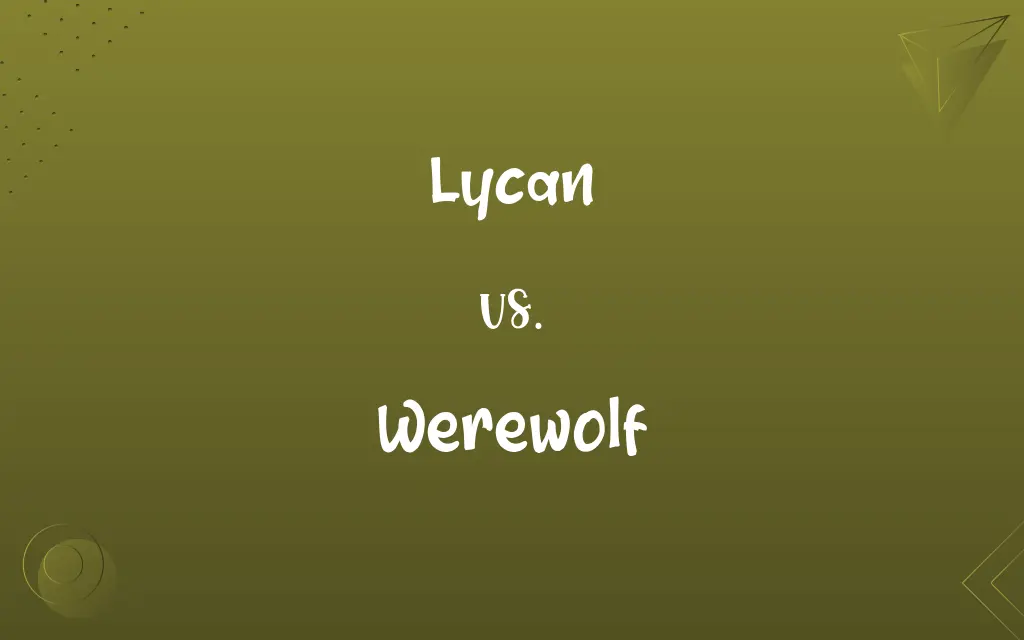Lycan vs. Werewolf: Know the Difference

By Shumaila Saeed || Published on January 25, 2024
Lycans are typically depicted as more powerful, controlled shape-shifters, while werewolves are often seen as cursed beings transforming involuntarily under a full moon.

Key Differences
Lycans and Werewolves are both rooted in mythology but differ in key aspects. Lycans, a term popularized in modern media, often refers to creatures that have the ability to transform into wolves at will. They are usually portrayed as retaining their human intellect and strength in wolf form. On the other hand, Werewolves are traditionally depicted as humans who transform into wolves involuntarily, typically during a full moon. This transformation is often depicted as a curse and comes with a loss of human consciousness.
Shumaila Saeed
Jan 25, 2024
In terms of origin, Lycans are a relatively modern addition to the mythological world, often featured in contemporary literature and films. They are usually depicted as part of ancient bloodlines with a rich lore and societal structure. Conversely, Werewolves have a much longer history in folklore, with tales dating back centuries in various cultures. These stories often portray them as solitary beings cursed by witchcraft or as a punishment for sins.
Shumaila Saeed
Jan 25, 2024
When considering control over transformation, Lycans are often shown as having full control over their ability to shift between human and wolf forms. This control allows them to use their powers strategically. Werewolves, however, typically have no control over their transformation, which is triggered by the full moon. Their transformations are often depicted as painful and unwilling, leading to chaos and destruction.
Shumaila Saeed
Jan 25, 2024
In terms of powers and abilities, Lycans are frequently shown as stronger and more agile than their werewolf counterparts. They are often depicted as warriors or protectors with enhanced senses in both human and wolf forms. In contrast, Werewolves are typically shown as more feral and animalistic, with their strength and senses heightened only in their wolf form.
Shumaila Saeed
Jan 25, 2024
Regarding their portrayal in popular culture, Lycans are often shown as protagonists or anti-heroes, with complex characters and moral dilemmas. Werewolves, on the other hand, are more commonly depicted as tragic figures or antagonists, struggling with their loss of humanity and the uncontrollable urge to cause harm.
Shumaila Saeed
Jan 25, 2024
ADVERTISEMENT
Comparison Chart
Control Over Transformation
Full control, can transform at will
No control, usually transforms during a full moon
Shumaila Saeed
Jan 25, 2024
Intellect in Beast Form
Retains human intellect and consciousness
Often loses human consciousness, acts on instinct
Shumaila Saeed
Jan 25, 2024
Origin in Mythology
Modern, featured in recent media
Ancient, with roots in diverse global folklore
Shumaila Saeed
Jan 25, 2024
Social Structure
Often part of ancient, organized societies
Typically depicted as solitary or cursed individuals
Shumaila Saeed
Jan 25, 2024
Portrayal in Media
Frequently as complex characters or anti-heroes
Commonly shown as tragic or antagonistic figures
Shumaila Saeed
Jan 25, 2024
ADVERTISEMENT
Lycan and Werewolf Definitions
Lycan
A creature of modern mythology, part of ancient lore.
The Lycan's lineage was as old as the forest itself.
Shumaila Saeed
Jan 11, 2024
Werewolf
Typically loses human consciousness when transformed.
Once a Werewolf, he could no longer recognize his friends.
Shumaila Saeed
Jan 11, 2024
Lycan
A mythical creature capable of transforming into a wolf at will.
The Lycan used his ability to guard the village at night.
Shumaila Saeed
Jan 11, 2024
Werewolf
Often depicted as a tragic figure, struggling with its dual nature.
The Werewolf's tale was one of sorrow and conflict.
Shumaila Saeed
Jan 11, 2024
Lycan
A being often depicted with heightened strength and agility.
The Lycan's enhanced senses made him an excellent tracker.
Shumaila Saeed
Jan 11, 2024
ADVERTISEMENT
Werewolf
A human cursed to transform into a wolf during a full moon.
The village feared the nights when the Werewolf roamed freely.
Shumaila Saeed
Jan 11, 2024
Lycan
Often portrayed with the ability to maintain human consciousness in wolf form.
Even as a wolf, the Lycan could communicate with his allies.
Shumaila Saeed
Jan 11, 2024
Werewolf
A mythical creature, often a symbol of uncontrollable nature.
In the legend, the Werewolf represented the wildness of the forest.
Shumaila Saeed
Jan 11, 2024
Lycan
A character in stories, usually with a complex background and moral compass.
The Lycan struggled with his responsibilities as a protector.
Shumaila Saeed
Jan 11, 2024
Werewolf
A being from ancient folklore, associated with witchcraft or punishment.
The curse turned him into a Werewolf as punishment for his misdeeds.
Shumaila Saeed
Jan 11, 2024
Werewolf
A person believed to have been transformed into a wolf or to be capable of assuming the form of a wolf.
Shumaila Saeed
Jan 10, 2024
Werewolf
(mythology) A person who is transformed or can transform into a wolf or a wolflike human, often said to transform during a full moon. Category:en:Horror
Shumaila Saeed
Jan 10, 2024
Werewolf
A person transformed into a wolf in form and appetite, either temporarily or permanently, whether by supernatural influences, by witchcraft, or voluntarily; a lycanthrope. Belief in werewolves, formerly general, is not now extinct.
The werwolf went about his prey.
The brutes that wear our form and face,The werewolves of the human race.
Shumaila Saeed
Jan 10, 2024
Repeatedly Asked Queries
Are Lycans and werewolves the same thing?
In many cases, Lycans and werewolves are considered to be similar creatures capable of transforming between human and wolf forms.
Shumaila Saeed
Jan 25, 2024
What is a Lycan?
A Lycan, short for Lycanthrope, is a mythical creature often depicted as a human capable of transforming into a wolf or wolf-like creature, typically during a full moon.
Shumaila Saeed
Jan 25, 2024
Do Lycans have control over their transformations?
In some legends, Lycans have more control over their transformations compared to traditional werewolves.
Shumaila Saeed
Jan 25, 2024
What triggers a werewolf transformation?
In many legends, a werewolf transformation is triggered by a full moon or by various supernatural curses or rituals.
Shumaila Saeed
Jan 25, 2024
Where does the term "Lycan" originate from?
The term "Lycan" is derived from the Greek word "lykánthropos," meaning "wolf-human."
Shumaila Saeed
Jan 25, 2024
Where does the term "werewolf" come from?
"Werewolf" is derived from Old English words "wer" (man) and "wulf" (wolf), meaning "man-wolf."
Shumaila Saeed
Jan 25, 2024
Are werewolves always evil?
Werewolves are often portrayed as dangerous and malevolent, but some stories depict them as victims of their condition, struggling with their dual nature.
Shumaila Saeed
Jan 25, 2024
Can werewolves be killed by silver?
In many werewolf legends, silver is considered a weakness, and silver bullets or weapons are often used to defeat or kill them.
Shumaila Saeed
Jan 25, 2024
Is "Lycan" a commonly used term?
"Lycan" is not as common as "werewolf" in popular culture, but it is sometimes used interchangeably to refer to similar creatures.
Shumaila Saeed
Jan 25, 2024
Do werewolves have human consciousness during their transformations?
In some stories, werewolves retain their human consciousness and struggle with the actions they commit while in wolf form, while in others, they become mindless beasts.
Shumaila Saeed
Jan 25, 2024
Are there any real-life beliefs in werewolves?
Werewolves are purely a product of folklore, mythology, and fiction, and there is no scientific evidence to support their existence in reality.
Shumaila Saeed
Jan 25, 2024
What is a werewolf?
A werewolf is a mythical creature or folklore character that transforms from a human into a wolf or wolf-like creature, often during a full moon.
Shumaila Saeed
Jan 25, 2024
Are there variations of werewolf legends in different cultures?
Yes, werewolf-like creatures appear in various cultures, each with unique characteristics and names, such as the "lycanthrope" in Greece and the "werecoyote" in some Native American folklore.
Shumaila Saeed
Jan 25, 2024
Can someone become a werewolf through a bite or curse?
In many werewolf tales, being bitten or cursed by a werewolf can transmit the condition to another person, turning them into a werewolf.
Shumaila Saeed
Jan 25, 2024
What are some famous werewolf stories or movies?
Classic werewolf stories include "The Wolfman" and "An American Werewolf in London," and they have been popular in folklore and horror fiction for centuries.
Shumaila Saeed
Jan 25, 2024
Share this page
Link for your blog / website
HTML
Link to share via messenger
About Author
Written by
Shumaila SaeedShumaila Saeed, an expert content creator with 6 years of experience, specializes in distilling complex topics into easily digestible comparisons, shining a light on the nuances that both inform and educate readers with clarity and accuracy.








































































